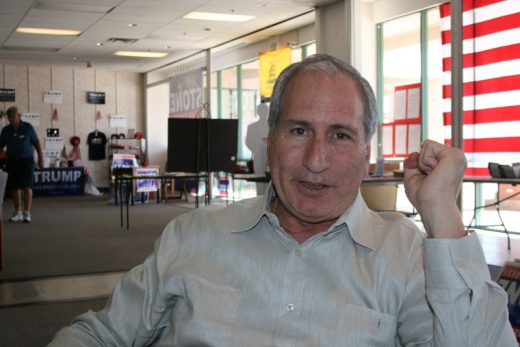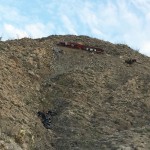
State Sen. Jeff Stone (R-28) is concerned about national security and homeland security threats facing our country. He believes these threats are imminent and that too little is being done to address them.
He also is frustrated that the current California tax structure prevents California from being a business-friendly state, and interferes with job creation and job growth.
Stone is running for election to the Congressional District 36 seat currently held by Democrat Dr. Raul Ruiz. Stone, a pharmacist by profession, previously served Idyllwild as Riverside County 3rd District supervisor. He is currently serving the 28th State Senate District that stretches from Southwest Riverside County (Temecula, Murrieta and Lake Elsinore) all the way to the Arizona border. Prior to his election as 3rd District supervisor in 2004, Stone served on the Temecula City Council and as mayor.
Stone said it was Democratic incumbent Ruiz’s support for the Iran nuclear deal crafted by the Obama administration that propelled him into this race.
“Not since the Cuban Missile Crisis has our nation been so close to nuclear war, and that is largely a result of a failed foreign policy by the current administration,” said Stone. He asserted that the Iran nuclear deal does little, if anything, to stop Iran from developing a nuclear bomb.
“Any inspections that are required require approval from the Iranian government well in advance of any scheduled visits. This will give Iranian scientists more than enough time to move their operations at existing facilities to ones that are not covered by the inspection request,” he said. (The deal has complex procedures for compelling inspections that could involve lengthy periods before inspectors are granted access, according to multiple analyses.)
Stone also sees comparable risks with North Korea, whose nuclear weapons program is rapidly advancing in march-step with its ancillary program to develop long-range ballistic missiles capable of delivering warheads to the U.S. West Coast. “We have the capability with our satellites to monitor each time North Korea places a missile on a launch site,” he said. “I propose that when those missiles go vertical we take them out. We authorize our military to go in and remove the threat. If we do nothing, we put our children and grandchildren at risk.”
Stone believes we must do more to invest in our military, and to develop the most modern weapon systems and delivery options. “We must also reinstitute our manned space program to protect our defense assets,” said Stone. “We cannot allow Russia or China to be the only nations capable of sending men and women into orbit to fix our satellites.”
With regard to terrorism, either foreign or homegrown, Stone suggests rebuilding our “human intelligence” network by giving the CIA resources necessary to keep our top officials informed of looming threats to national security.
On other issues, Stone believes our political system is corrupted by and beholden to special-interest money, both corporate and union. “There should be limits on them both — no more hiding behind names people can’t recognize. We need transparency in campaign financing. I’d consider federal legislation for limits on campaign contributions — make those running for office work harder at the grass-roots level. Elections should not be bought, they should be earned.”
He also believes the Internal Revenue Service needs to be streamlined. He recommends simplifying the current tax code and instituting a flat-tax rate of 20 percent, maintaining charitable giving and home-mortgage deductions. “Also, if a flat tax is not adopted, we should reduce the corporate income tax rate from 35 percent to 20 percent to be more in line with individual tax filers,” said Stone.
Stone advocates reforming welfare rules to require “able-bodied” recipients to give back to their communities as a condition of receiving federal aid — a minimum of 20 hours per week of accredited public service, unless the recipients are in school.
As general financial revisions, he suggests making tuition at any college or university (public or private) deductible on state and federal returns with a cap of $10,000 per year; allowing rent to be deductible just like mortgage interest; and doing away with private mortgage insurance.
On health care, an important consideration in this election, Stone said he supports national health care for anyone with pre-existing conditions and for the indigent, and catastrophic care for the middle class or below.
He suggests privatizing the Veterans Administration and letting public and private hospitals compete for the business.
He believes Zika is a major threat to this district and to the country, with the potential to become a pandemic. “We should not be playing politics with a health-and-safety issue,” he stressed. “Just strip the bill [HR 4446] and pass it.”
Asked what he would do if he loses this CD 36 election, Stone was philosophical. “I don’t need to do this for a living,” he reflected. “I’ve been very fortunate in my private-sector life. I have my compounding pharmacy and real-estate investments. I’ll have to see where I am at that point in my life. I would have an important decision to make. As both a county supervisor and state senator, I feel like I have made a difference.”
In both his time as 3rd District supervisor and as state senator, Stone can count significant achievements that have made a difference. Idyllwild might not have gotten its new library without Stone’s commitment and support.
As state senator, he has reached across the aisle to co-sponsor bills that Gov. Jerry Brown has signed — including a “prescription drug take back” bill that provides specially designed storage receptacles in participating pharmacies for customers to dispose of unused or expired prescription drugs at no cost to customers.
Another bill allows terminally ill patients to use experimental drugs or procedures that have successfully completed phase one of a clinical trial approved by the U.S. Food and Drug Administration, but have not yet been approved for general use.
And another bill will allow out-of-state licensed doctors to volunteer their time and skills while visiting in chronically underserved California communities and areas.
Stone has built his political career and reputation by being direct, staking out positions to which he maintains his commitment, and by keeping his word. “For me, the most important quality is telling the truth,” he said.
Stone said if he is elected to Congress, he would dedicate his congressional salary (approximately $174,000 annually) to charity.










